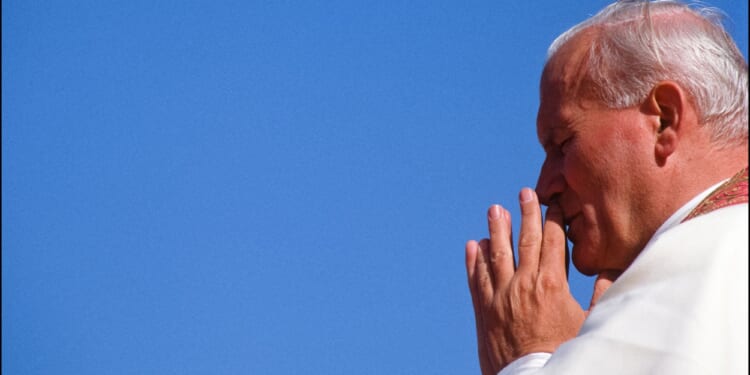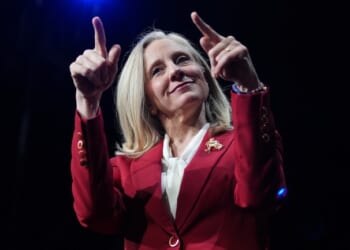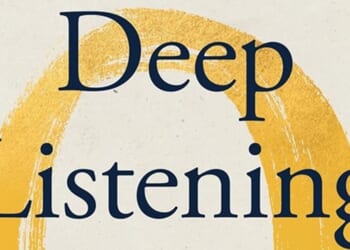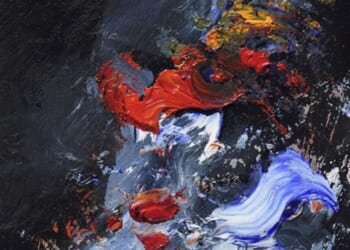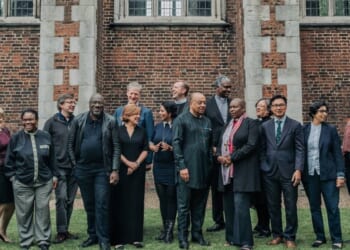Oct. 22 is the Catholic feast day in remembrance of Pope St. John Paul II. The story of his life is an inspiration for countless Catholics and non-Catholics. His witness of faith and courage in the face of darkness continues to shine as an example to the world for how we ought to respond to trials in our own lives.
Growing up in Communist Poland, John Paul lost every member of his immediate family by the time he was 20 years old. His mother died when he was very young, then his brother as a teenager, and finally his father as he entered the second decade of his life. Despite experiencing such tragedy, Karol Wojtyla entered the underground seminary in order to say yes to the call from God to be a priest. He risked his life to do so.
The theme of sacrificial love and the willingness to place others before himself was the constant chorus of his life. Early in his papacy, this was personified in his visit to his hometown of Poland in June 1979. John Paul desired to see his home country and pray with one of the most vibrant and unshakeable Catholic nations the world has ever seen.
There is no doubt that the Polish authorities at that time didn’t want his visit to happen. However, if they forbid him from arriving, they risked outraging the people as well as admitting that this faith leader actually had an impact on the real world. Faith was deemed irrelevant, ridiculous, and unnecessary. If they allowed him to come, they knew that large groups of Catholics may come out to meet him, which could spark an uprising from the people and leave Poland more susceptible to invasion from the Soviet Union.
Peggy Noonan’s excellent book titled “John Paul the Great: Remembering a Spiritual Father” recounts this scene and the events that surrounded it. It is vividly clear that the pope’s willingness to place himself against the powers of totalitarianism emboldened the people of Poland to hope for better lives and a more authentic experience of freedom. On the very first day of the trip, the pope offered Mass in Victory Square in Warsaw. While the communists attempted to keep the gathering as quiet as possible, over 1 million Poles attended.
In his homily, the pope noted that the Polish people have become a new version of witnesses (not dissimilar to the early Apostles). This was due to the fact that Poland was on the world stage as a nation being persecuted. In such a context of global and public suffering, John Paul urged those attending to consider that such witnesses have a duty and obligation. “Are we capable of them?” he asked the multitudes gathered.
In order to be a witness who is convicted to pronounce the truth and bring about change, John Paul II said that we must remember the reality of the human person. Who are we and what are we made for? The human person can only be understood in reference to God. For Poland, the pope said that her history does not make sense without Christ because the community of Poland has always been so entrenched in its faith.
“If we reject this key to understanding our nation,” he continued, “we lay ourselves open to a substantial misunderstanding. We no longer understand ourselves. It is impossible without Christ to understand this nation with its past so full of splendor and also of terrible difficulties.”
The pope was noting that only with God can we know that our suffering will not have the last word. Only in clinging to one’s relationship with the God who defeated death can we rise above any trial and renew our world.
To illustrate this point even further, the pope ended his words with reference to the fact that Victory Square housed the tomb of the Unknown Soldier. All over the world, he noted, there are tombs that are unnamed. Tombs that remind us of the countless witnesses who sacrificed their lives for our freedoms. Their lives and their deaths shout out to the world that the inviolable rights of man are worth sacrificing for.
The suffering of the Poles was a fact, and the pope was both recognizing it and asking them to accept the invitation to provide witness to the redeeming quality of sacrificial love. He asked the crowd if they were willing to accept the duties that come along with such a witness. Their response is noted by Noonan to sound like “thunder” as they began to chant, “We want God, we want God, we want God … ”
Authors and scholars have recounted that the pope’s journey to Poland marked a shift toward the demise of communism in Europe. He ignited hope in his homeland because he witnessed to the need for God, the power of sacrifice, and the capacity of each person to aid the renewal of the world.
In order to be those witnesses that Poland needed, and to be the witnesses that our world needs today, we must be willing to place God back in the picture of society. We also must be willing to place our reputations on the line to proclaim the truth and proclaim the dignity of each person. If each person does so, we will see another renewal across the globe similar to that in Poland. Because God is what we need and sacrifice conquers all darkness—if we witness to it.
We publish a variety of perspectives. Nothing written here is to be construed as representing the views of The Daily Signal.

